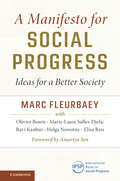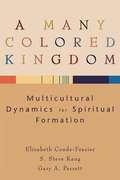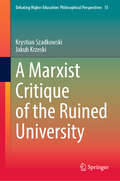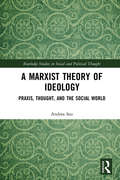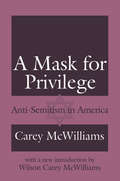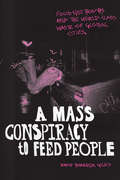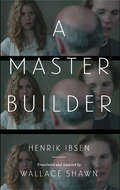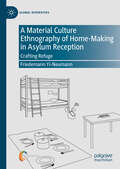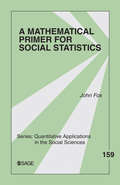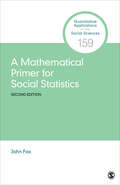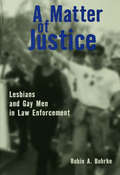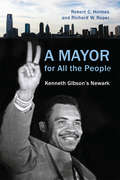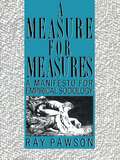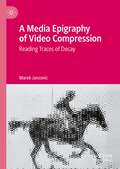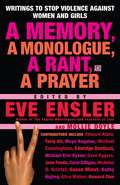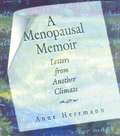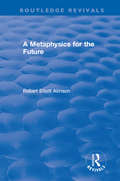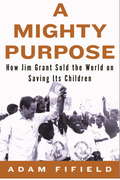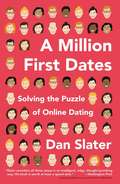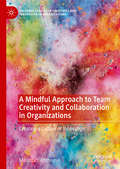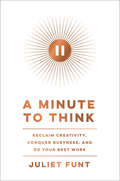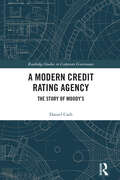- Table View
- List View
A Manifesto for Social Progress: Ideas For A Better Society
by Helga Nowotny Ravi Kanbur Marc Fleurbaey Elisa Reis Olivier Bouin Salles-Djelic Marie-LaureAt this time when many have lost hope amidst conflicts, terrorism, environmental destruction, economic inequality and the breakdown of democracy, this beautifully written book outlines how to rethink and reform our key institutions - markets, corporations, welfare policies, democratic processes and transnational governance - to create better societies based on core principles of human dignity, sustainability, and justice. This new vision is based on the findings of over 300 social scientists involved in the collaborative, interdisciplinary International Panel on Social Progress. Relying on state-of-the-art scholarship, these social scientists reviewed the desirability and possibility of all relevant forms of long-term social change, explored current challenges, and synthesized their knowledge on the principles, possibilities, and methods for improving the main institutions of modern societies. Their common finding is that a better society is indeed possible, its contours can be broadly described, and all we need is to gather forces toward realizing this vision.
A Many Colored Kingdom: Multicultural Dynamics for Spiritual Formation
by Elizabeth Conde-Frazier S. Steve Kang Gary A. ParrettThe authors describe relevant aspects of their own personal journeys, key issues emerging from their studies and teaching germane to race, culture, and ethnicity; and teaching implications that bring right practice to bear on church ministry.
A Marxist Critique of the Ruined University (Debating Higher Education: Philosophical Perspectives #15)
by Krystian Szadkowski Jakub KrzeskiThis book revitalizes the Marxian concept of critique for research into the transformation of universities. It consists of a set of comprehensive and interconnected theoretical tools, starting from the reflection on the political ontology of higher education, through the critique of political economy of the sector to the analysis of activist struggles within the universities, and back to the ontological concept of the common – a foundation for the university alternative design. The tools offered and discussed in context throughout the book allow for a productive use in overcoming the current crisis of the university, as well as to avoid the pitfalls present in contemporary debates around it. Unlike the dominant discussions on the university in crisis, the authors argue that to grasp its nature, one has to reach more profound than the level of appearances such as marketization and commodification. Szadkowski and Krzeski offer a compelling reappraisal of critique as a mechanism to liberate intellectual work. By linking critique to how knowledge is structured and commodified, they help us transcend reductionist narratives of a crisis-ridden University. Prioritising ontological renewal, they embrace the political and the common, enriching our collective ways of knowing the world as a movement. Pivoting around academic and student protests in Poland, the book enables us to imagine spaces and times of critical hope that resist the capitalist subjugation of intellectual activity to knowledge production. Richard Hall, Professor of Education and Technology, De Montfort University, Leicester, UK In the century since Antonio Gramsci new works in the Marxist tradition have made only modest contributions to social thought: the combined result of the savage repression in the West of the dangerous revolutionary ideas, plus the collapse in the East into jacobin conspiracy and dogmatism. If a living, vibrant Marxism had been part of the twentieth century mainstream then much catastrophe would have been averted. Now the drive for capital accumulation, sovereign individualism and rampant nationalism have brought us to the brink of ecological disaster and World War III. Into the void step two emerging scholars, Krystian Szadkowski and Jakub Krzeski with an original Marxist critique of higher education and the common good. There is hope in this development, vital resources for reflection, discussion and action. Simon Marginson, Professor of Higher Education at the Universities of Bristol and Oxford, UK, Honorary Professor at Tsinghua University in China, and Joint Editor in Chief of the journal 'Higher Education'
A Marxist Theory of Ideology: Praxis, Thought and the Social World (Routledge Studies in Social and Political Thought)
by Andrea SauThis work explores the question of defining ideology from a Marxist perspective. Advancing beyond the schemas of discussion presented in current Marxist literature, the author offers an account of how the concept of ideology should be defined and what role it plays within historical materialism. Through a close reading of Karl Marx’s relevant writings, this volume demonstrates that while there is no coherent, single account of ideology in Marx’s work, his materialist framework can be reconstructed in a defensible and ‘non-deterministic’ way. The definition of ideology presented is then articulated through a close reading of Antonio Gramsci’s Prison Notebooks. Efforts are also made to demonstrate that Gramsci’s interpretation of historical materialism is indeed consistent and compatible with Marx’s. A systematic articulation of a theory of ideology that combines the works of Marx and Gramsci, as well as adding elements of Pierre Bourdieu’s social theory and William James’s psychology, this volume will appeal to scholars of social and political theory with interests in political economy and Marxist thought.
A Mask for Privilege: Anti-semitism in America
by Carey McWilliams Wilson Carey McWilliamsWhy in America should the most sinister of European social diseases have taken root? Why should that disease have spread from its seemingly anachronistic beginning in the Gilded Age until it infected many of our great magazines and newspapers? Until it determined not only where a man might stay the night, but where he got his education and how he earned his living? This book answers such questions by exposing the myths with which the anti-Semite surrounds his position. By taking away the "mask of privilege" it reveals the source of such prejudice for what it is--the determination of the forces of special privilege, with their hangers-on, to maintain their select and exclusive status regardless of the consequences to other human beings. Like Carey McWilliams's other books on minorities in America, 'A Mask for Privilege' reveals the facts of discrimination so that the fogs of prejudice may be dispersed by the truth. It traces the growth of discrimination and persecution in America from 1877 to 1947, shows why Jews are such good scapegoats, and contrasts the Jewish stereotype--"too pushing, too cunning" with that of other minority groups. Then it looks at the anti-Semitic personality and concludes, with Sartre, that here is "a man who is afraid"--of himself. In his stirring new introduction, Wilson Carey McWilliams calls this a work of recovery "evoking names and moods and incidents now either half-forgotten or lost to memory." This brilliant analysis of anti-Semitism is a documented and forceful attempt to inform Americans about the danger of the undemocratic, antisocial practices in their midst, and to suggest a positive program to arrest a course too similar to that which led to the Holocaust. It transcends majority-minority relations and becomes an analysis of antidemocratic practices, which affect the whole fabric of American life.
A Mass Conspiracy to Feed People: Food Not Bombs and the World-Class Waste of Global Cities
by David Boarder GilesIn A Mass Conspiracy to Feed People, David Boarder Giles explores the ways in which capitalism simultaneously manufactures waste and scarcity. Illustrating how communities of marginalized people and discarded things gather and cultivate political possibilities, Giles documents the work of Food Not Bombs (FNB), a global movement of grassroots soup kitchens that recover wasted grocery surpluses and redistribute them to those in need. He explores FNB's urban contexts: the global cities in which late-capitalist economies and unsustainable consumption precipitate excess, inequality, food waste, and hunger. Beginning in urban dumpsters, Giles traces the logic by which perfectly edible commodities are nonetheless thrown out—an act that manufactures food scarcity—to the social order of “world-class” cities, the pathways of discarded food as it circulates through the FNB kitchen, and the anticapitalist political movements the kitchen represents. Describing the mutual entanglement of global capitalism and anticapitalist transgression, Giles captures those emergent forms of generosity, solidarity, and resistance that spring from the global city's marginalized residents.
A Master Builder
by Henrik Ibsen Wallace Shawn"Wallace Shawn is one of the most complex and uncompromising moralists of the American theater." - Ben Brantley, New York Times"At once the U.S.'s most profound and overlooked playwright." - David HareThis translation and adaptation of Henrik Ibsen's Master Builder Solness by Wallace Shawn, a writer known for his own bleakly hilarious and provocative plays, was used by legendary director André Gregory during fifteen years of work on a theatrical production which, instead of being produced as a play, was made into a film by Jonathan Demme-a film that is an utterly contemporary vision of Ibsen's classic play.
A Material Culture Ethnography of Home-Making in Asylum Reception: Crafting Refuge (Global Diversities)
by Friedemann Yi-NeumannThis book explores what it takes to create a sense of home while in exile, drawing on ethnographic research conducted in German asylum reception facilities from 2016-2020. From a material culture perspective, it examines how asylum seekers and migrants with precarious legal status ‘translate’ aspects of home into challenging environments. Through these translations—processual shifts of objects, habits, and ideas across borders—migrants work to reassemble a sense of belonging. The book delves into the material, social, and individual efforts involved in this homing process, while highlighting the ongoing impact of dispossession and loss. By focusing on personal attachments to objects and the broader context of migration, this work offers a unique perspective on forced migration, home cultures, and the quest for ontological security. The book will be of interest to scholars, researchers, and students in disciplines such as anthropology, sociology, and human geography as well as other research interested in ethnographic perspectives on the respective topics.
A Mathematical Primer for Social Statistics
by Dr John FoxJohn Fox's A Mathematical Primer for Social Statistics covers many often ignored yet important topics in mathematics and mathematical statistics. This text provides readers with the foundation on which an understanding of applied statistics rests. Intended Audience This book is ideal for advanced undergraduates, graduate students, and researchers in the social sciences who need to understand and use relatively advanced statistical methods but whose mathematical preparation for this work is insufficient. Learn more about "The Little Green Book" QASS Series! Click Here.
A Mathematical Primer for Social Statistics (Quantitative Applications in the Social Sciences)
by John FoxA Mathematical Primer for Social Statistics, Second Edition presents mathematics central to learning and understanding statistical methods beyond the introductory level: the basic "language" of matrices and linear algebra and its visual representation, vector geometry; differential and integral calculus; probability theory; common probability distributions; statistical estimation and inference, including likelihood-based and Bayesian methods. The volume concludes by applying mathematical concepts and operations to a familiar case, linear least-squares regression. The Second Edition pays more attention to visualization, including the elliptical geometry of quadratic forms and its application to statistics. It also covers some new topics, such as an introduction to Markov-Chain Monte Carlo methods, which are important in modern Bayesian statistics. A companion website includes materials that enable readers to use the R statistical computing environment to reproduce and explore computations and visualizations presented in the text. The book is an excellent companion to a "math camp" or a course designed to provide foundational mathematics needed to understand relatively advanced statistical methods.
A Mathematical Primer for Social Statistics (Quantitative Applications in the Social Sciences)
by John FoxA Mathematical Primer for Social Statistics, Second Edition presents mathematics central to learning and understanding statistical methods beyond the introductory level: the basic "language" of matrices and linear algebra and its visual representation, vector geometry; differential and integral calculus; probability theory; common probability distributions; statistical estimation and inference, including likelihood-based and Bayesian methods. The volume concludes by applying mathematical concepts and operations to a familiar case, linear least-squares regression. The Second Edition pays more attention to visualization, including the elliptical geometry of quadratic forms and its application to statistics. It also covers some new topics, such as an introduction to Markov-Chain Monte Carlo methods, which are important in modern Bayesian statistics. A companion website includes materials that enable readers to use the R statistical computing environment to reproduce and explore computations and visualizations presented in the text. The book is an excellent companion to a "math camp" or a course designed to provide foundational mathematics needed to understand relatively advanced statistical methods.
A Matter of Justice: Lesbians and Gay Men in Law Enforcement
by Robin BuhrkeAll too often, gays and lesbians are not accepted by the criminal justice community because of their sexual orientation, and because they are criminal justice personnel, they are not accepted by lesbians and gay men. Written by a past liaison between the Miami Beach Police Department and the lesbian, gay and bisexual community, A Matter of Justice
A Mattress Maker's Daughter: The Renaissance Romance of Don Giovanni De' Medici and Livia Vernazza
by Brendan Dooley"A Mattress Maker's Daughter "richly illuminates the narrative of two people whose mutual affection shaped their own lives and in some ways their times. According to the Renaissance legend told and retold across the centuries, a woman of questionable reputation bamboozles a middle-aged warrior-prince into marrying her, and the family takes revenge. He is Don Giovanni de' Medici, son of the Florentine grand duke; she is Livia Vernazza, daughter of a Genoese artisan. They live in luxury for a while, far from Florence, and have a child. Then, Giovanni dies, the family pounces upon the inheritance, and Livia is forced to return from riches to rags. Documents, including long-lost love letters, reveal another story behind the legend, suppressed by the family and forgotten. Brendan Dooley investigates this largely untold story among the various settings where episodes occurred, including Florence, Genoa, and Venice. In the course of explaining their improbable liaison and its consequences, "A Mattress Maker's Daughter "explores early modern emotions, material culture, heredity, absolutism, and religious tensions at the crux of one of the great transformations in European culture, society, and statecraft. Giovanni and Livia exemplify changing concepts of love and romance, new standards of public and private conduct, and emerging attitudes toward property and legitimacy just as the age of Renaissance humanism gave way to the culture of Counter-Reformation and early modern Europe.
A Mayor for All the People: Kenneth Gibson's Newark
by Steve Adubato Junius Williams Ronald Rice David Dinkins Sheila Oliver Fred Means Barbara Kukla Martin Bierbaum Sharpe James Fran Adubato Sheldon Bross Elizabeth Del Tufo Robert Pickett Marie Villani Harold Hodes William Payne Grizel Ubarry Deforest B. Soaries Elton Hill Harold Gibson Camille Savocca GibsonIn 1970, Kenneth Gibson was elected as Newark, New Jersey’s first African-American mayor, a position he held for an impressive sixteen years. Yet even as Gibson served as a trailblazer for black politicians, he presided over a troubled time in the city’s history, as Newark’s industries declined and its crime and unemployment rates soared. This book offers a balanced assessment of Gibson’s leadership and his legacy, from the perspectives of the people most deeply immersed in 1970s and 1980s Newark politics: city employees, politicians, activists, journalists, educators, and even fellow big-city mayors like David Dinkins. The contributors include many of Gibson’s harshest critics, as well as some of his closest supporters, friends, and family members—culminating in an exclusive interview with Gibson himself, reflecting on his time in office. Together, these accounts provide readers with a compelling inside look at a city in crisis, a city that had been rocked by riots three years before Gibson took office and one that Harper’s magazine named “America’s worst city” at the start of his second term. At its heart, it raises a question that is still relevant today: how should we evaluate a leader who faced major structural and economic challenges, but never delivered all the hope and change he promised voters?
A Measure for Measures: A Manifesto for Empirical Sociology
by R PawsonFirst Published in 2004. Routledge is an imprint of Taylor & Francis, an informa company.
A Media Epigraphy of Video Compression: Reading Traces of Decay
by Marek JancovicThis book explores the historical interrelationships between mathematics, medicine and media, and offers a unique perspective on how video compression has shaped our relationship with moving images and the world. It situates compression in a network of technological, visual and epistemic practices spanning from late 18th-century computational methods to the standardization of electrical infrastructure and the development of neurology throughout the 1900s. Bringing into conversation media archaeology, science and technology studies, disability studies and queer theory, each chapter offers an in-depth look at a different trace of compression, such as interlacing, macroblocking or flicker. This is a story of forgotten technologies, unusual media practices, strange images on the margins of visual culture and inventive ways of looking at the world. Readers will find illuminating discussions of the formation of complex scientific and medical systems, and of the violent and pleasurable interactions between our bodies and media infrastructure.
A Memory, a Monologue, a Rant, and a Prayer: Writings to Stop Violence Against Women and Girls
by Eve Ensler Mollie DoyleSelections from the "Until the Violence Stops" Festival Featuring writings by Abiola Abrams * Edward Albee * Tariq Ali * Maya Angelou * Periel Aschenbrand * Patricia Bosworth * Nicole Burdette * Kate Clinton * Kimberle Crenshaw * Michael Cunningham * Edwidge Danticat * Ariel Dorfman * Mollie Doyle * Slavenka Drakulic * Michael Eric Dyson * Dave Eggers * Kathy Engel * Eve Ensler * Jane Fonda * Carol Gilligan * Jyllian Gunther * Suheir Hammad * Christine House * Marie Howe * Carol Michèle Kaplan * Moisés Kaufman * Michael Klein * Nicholas Kristof * James Lecesne * Elizabeth Lesser * Mark Matousek * Deena Metzger * Susan Miller * Winter Miller * Susan Minot * Robin Morgan * Kathy Najimy * Lynn Nottage * Sharmeen Obaid-Chinoy * Sharon Olds * Hanan al-Shaykh * Anna Deavere Smith * Diana Son * Monica Szlekovics * Robert Thurman * Betty Gale Tyson * Alice Walker * Jody Williams * Erin Cressida Wilson * Howard Zinn This groundbreaking collection, edited by author and playwright Eve Ensler, features pieces from "Until the Violence Stops," the international tour that brings the issue of violence against women and girls to the forefront of our consciousness. These diverse voices rise up in a collective roar to break open, expose, and examine the insidiousness of brutality, neglect, a punch, or a put-down. Here is Edward Albee on S&M; Maya Angelou on women's work; Michael Cunningham on self-mutilation; Dave Eggers on a Sudanese abduction; Carol Gilligan on a daughter witnessing her mother being hit; Susan Miller on raising a son as a single mother; and Sharon Olds on a bra. These writings are inspired, funny, angry, heartfelt, tragic, and beautiful. But above all, together they create a true and profound portrait of this issue's effect on every one of us. With information on how to organize an "Until the Violence Stops" event in your community,A Memory, a Monologue, a Rant, and a Prayeris a call to the world to demand an end to violence against women. "In the current era, it takes some brain racking to think of anyone else doing anything quite like Ensler. She's a countercultural consciousness-raiser, an empowering figure, a truth-teller. " -Chicago Tribune
A Menopausal Memoir: Letters from Another Climate
by Ellen Cole Esther D Rothblum Anne C HerrmannThe only extended, first-person narrative about menopause, A Menopausal Memoir: Letters from Another Climate explores the connection between menopause, mourning, and memory through nine fictional letters written to different addressees. The letters explain the author’s own experience of having a hysterectomy (without her permission) during surgery for endometriosis and being thrown into instant menopause. Herrmann expresses her experiences differently in each letter based on the recipient’s gender, sexual identity, and age, revealing the complexities of accepting menopause. Psychotherapists, psychologists, physicians, medical students, academics, and those interested in women’s health and women’s studies will receive insight into one woman’s experience and will learn how our bodies mold our sexual identity and shape many aspects of our lives.Writing these letters from the point of view of a scholar engaged in personal narrative but not in the familiar narrative of a woman married with children, Herrmann examines her journey of loss, recovery, and healing through feminist theory. The letters in A Menopausal Memoir reveal many other issues, including: the relationship between the female body and the meanings attached to it the different ways women tell their stories about difficult experiences negotiating the relationship between growing older and sexual identity the body’s response(s) to the loss of organs that form/inform its history the connection between body, identity, and disease A highly personal, yet theoretical, approach to the experience of menopause, A Menopausal Memoir explores how changes in the body affect your sexual identity, your relationships, and your feelings as a woman.
A Metaphysics for the Future (Routledge Revivals)
by Robert AllinsonThis title was first published in 2001. This work is intended to serve not only as an expression of a new idea of a philosophy, but as an "apologia" for philosophy as a legitimate and independent discipline in its own right. It argues that in the 20th century, truth has not been abandoned, but merely modified. The text proposes a return to truth and suggests that it is only after apprehending the truths of consciousness that the philosopher's mirror may become a kaleidoscope through which reality may be contemplated. First order truth lies in the realm of discovery, and discovery takes place only within the moment of subjective re-enactment.
A Mighty Purpose
by Adam FifieldThe inspiring story of how the iconoclastic humanitarian Jim Grant succeeded in saving the lives of tens of millions of children through his extraordinary ability to win over world leaders Nicholas Kristof hailed Jim Grant as a man who "probably saved more lives than were destroyed by Hitler, Mao, and Stalin combined." Nominated by President Jimmy Carter to head UNICEF, Grant ran the United Nations agency from 1980 to 1995 and became the most powerful advocate for children the world has ever seen. To ensure that even children trapped by war received health care and immunizations, he brokered humanitarian ceasefires by exploiting the political self-interests of presidents and warlords alike. Grant at first met fierce resistance at the United Nations and in his own organization, and some thought his ideas were crazy and dangerous. But as he kept toppling obstacle after obstacle, he eventually won over even his most stubborn detractors. Grant spearheaded a historic surge in worldwide childhood immunization rates and launched a movement that profoundly altered the face of global health and international development.
A Million First Dates
by Dan Slater** Previously published in hardcover as Love in the Time of Algorithms ** Once considered the realm of the lonely and desperate, sites like eHarmony, Match, OkCupid, and Plenty of Fish have been embraced by pretty much every demographic. Dating has been transformed from a daunting transaction based on scarcity to one in which the possibilities are almost endless. Now anyone can search for exactly what they want, connect with more people, and get more information about those people than ever before. As journalist Dan Slater shows, online dating is changing society in more profound ways than we imagine. He explores how these new technologies, by altering our perception of what's possible, are reconditioning our feelings about commitment and challenging the traditional paradigm of adult life. Slater takes readers behind the scenes of a fascinating business. Dating sites capitalize on our quest for love, but how do their creators' ideas about pro ts, morality, and the nature of desire shape the virtual worlds they've created for us?
A Mindful Approach to Team Creativity and Collaboration in Organizations: Creating a Culture of Innovation (Palgrave Studies in Creativity and Innovation in Organizations)
by Melinda J. RothouseThis book examines how contemplative arts practice and a mindful approach to creativity, can be used to offer new possibilities for facilitating team creativity and collaboration in organizational settings. The author employs a qualitative, action research paradigm, using arts‐based and ethnographic methods, to explore the perceived effects of a contemplative arts workshop process on team creativity and collaboration within an organization. The book demonstrates how a contemplative arts workshop process may be used to facilitate mindfulness, trust, communication, collaboration, and creative insights among teams and working groups. It explores each of these themes in depth and develops a model based on those findings. The model includes five elements: 1. Individual-Level Mindfulness, 2. Trust and Authentic Communication, 3. Team Cohesion and Collaboration, 4. Creative Ideation and Insights, and 5. Leadership: Creating a Culture of Innovation. Combining theory and practice, the book offers a series of mindfulness and contemplative arts exercises that facilitators can use to address each of the five levels of the model. This book weaves together contemporary psychological research on mindfulness and organizational creativity along with practical applications and contemplative arts exercises for practitioners and scholars of workplace creativity, management and organisational and industrial psychology.
A Minute to Think: Reclaim Creativity, Conquer Busyness, and Do Your Best Work
by Juliet Funt“You’re going to want to share copies of this book with your overbooked friends and colleagues, but before you do, take some time to read it yourself. Funt’s wisdom around making space is priceless.” —Seth Godin, author of The PracticeDo you wish you could stop the mayhem of work and life and just take a minute? Do you sense you could contribute more if there were a little more room in the day? Does busyness deprive you and your burnt-out team of the oxygen your talents need to catch fire?Many have felt that way, yet taking a pause has seemed impossible—until now.In A Minute to Think, Juliet Funt, a globally recognized warrior in the battle against busyness, provides a powerful guide that will give you the permission, framework, and specific direction you need to do the following:Regain control of your overloaded, caffeinated, inbox-worshiping workdayLiberate yourself and your teams from burnout and busyworkReclaim creativity and focus despite the chaos around youBring thoughtfulness into designing your next work normsTame the beast of email and escape the mire of meetingsFind your precious minute to thinkYou’re not alone in your yearning for freedom from constant reactivity. The global workforce today is so fried that it belongs in the food court of a county fair. We’re relentlessly behind the curve, dousing fires everywhere, and our 3 a.m. insomnia provides the only unscheduled thinking time of the day.What we need reinserted in our lives is the missing element of white space—short periods of open, unscheduled time that, when recaptured, change the very nature of work. White space is the stepping back, the strategic pause, the oxygen that allows the sparks of our efforts to catch fire. White space has the power to radically—and simply—reinvent the way we approach work in this maxed-out, post-COVID 21st-century world.With Juliet’s memorable stories, easy-to-use tools, and razor-sharp instruction, she carves for us an escape route from the overwhelming amount of low-value tasks and the daily avalanche of e-mails, meetings, decks, and reports. Using research, client stories, and a relatable voice, Juliet shows all of us how to reclaim time for thinking and make room for what truly matters. Whether you are an individual trying to build a more sane and humane flow of daily work, a team that wants new levels of efficiency and effectiveness, or an entire organization changing your culture toward thoughtfulness, this book will lead you there.
A Modern Credit Rating Agency: The Story of Moody’s (Routledge Studies in Corporate Governance)
by Daniel CashThis book aims to present a picture of one of the world’s leading credit rating agencies. Credited as being the first credit rating agency, Moody’s stands as the epitome of the rating sector and all that it effects. However, outside of internal and non-public histories compiled within the rating agency itself, the story of Moody’s has never been told, until now. However, this is not a historical book. Rather, this book paints a picture of Moody’s on a wider canvas that introduces the concept of rating to you, taking into account the origins of the sector, the competitive battles that formed the modern-day oligopoly, and the characters that have each taken their turn on sculpting the industry that, today, is critical to the modern economy. The book is a story of personable people who provided the market with what it needed, but it is more than that. It is a story of conflict, impact, strategy, and most of all the relationship between big business and modern society. Standing as the gatekeeper to the capital markets that form the core of modern society, Moody’s represents the very best of what the marketplace can produce, but also the very worst. This story takes in economic crises in the antebellum US, the Panics of the early 1900s, the Wall Street Crash and the Great Depression and, of course, the Global Financial Crisis. It does this because, at the heart of each one was a member of the rating industry or the reporting industry that preceded it. Associated with almost any financial scandal you may care to remember the credit rating agencies, in their often-uncomfortable role as gatekeepers, have their fingerprints on most financial scandals and calamities. This book tells the story of the industry’s founding member.
A Modern Credit Rating Agency: The Story of Moody’s (Routledge Studies in Corporate Governance)
by Daniel CashThis book aims to present a picture of one of the world’s leading credit rating agencies. Credited as being the first credit rating agency, Moody’s stands as the epitome of the rating sector and all that it effects. However, outside of internal and non-public histories compiled within the rating agency itself, the story of Moody’s has never been told, until now. However, this is not a historical book. Rather, this book paints a picture of Moody’s on a wider canvas that introduces the concept of rating to you, taking into account the origins of the sector, the competitive battles that formed the modern-day oligopoly, and the characters that have each taken their turn on sculpting the industry that, today, is critical to the modern economy.The book is a story of personable people who provided the market with what it needed, but it is more than that. It is a story of conflict, impact, strategy, and most of all the relationship between big business and modern society. Standing as the gatekeeper to the capital markets that form the core of modern society, Moody’s represents the very best of what the marketplace can produce, but also the very worst. This story takes in economic crises in the antebellum US, the Panics of the early 1900s, the Wall Street Crash and the Great Depression and, of course, the Global Financial Crisis. It does this because, at the heart of each one was a member of the rating industry or the reporting industry that preceded it. Associated with almost any financial scandal you may care to remember the credit rating agencies, in their often-uncomfortable role as gatekeepers, have their fingerprints on most financial scandals and calamities. This book tells the story of the industry’s founding member.
